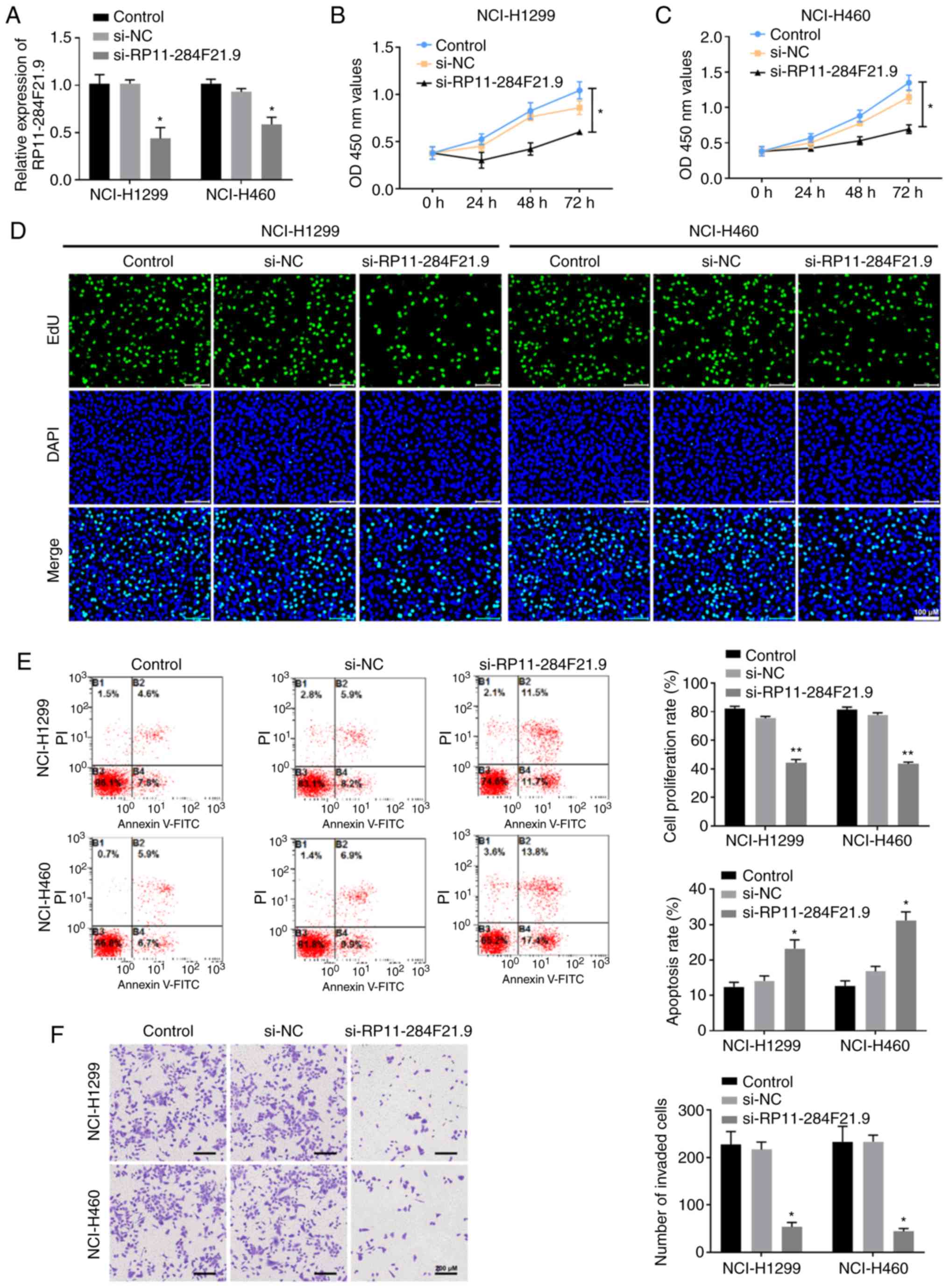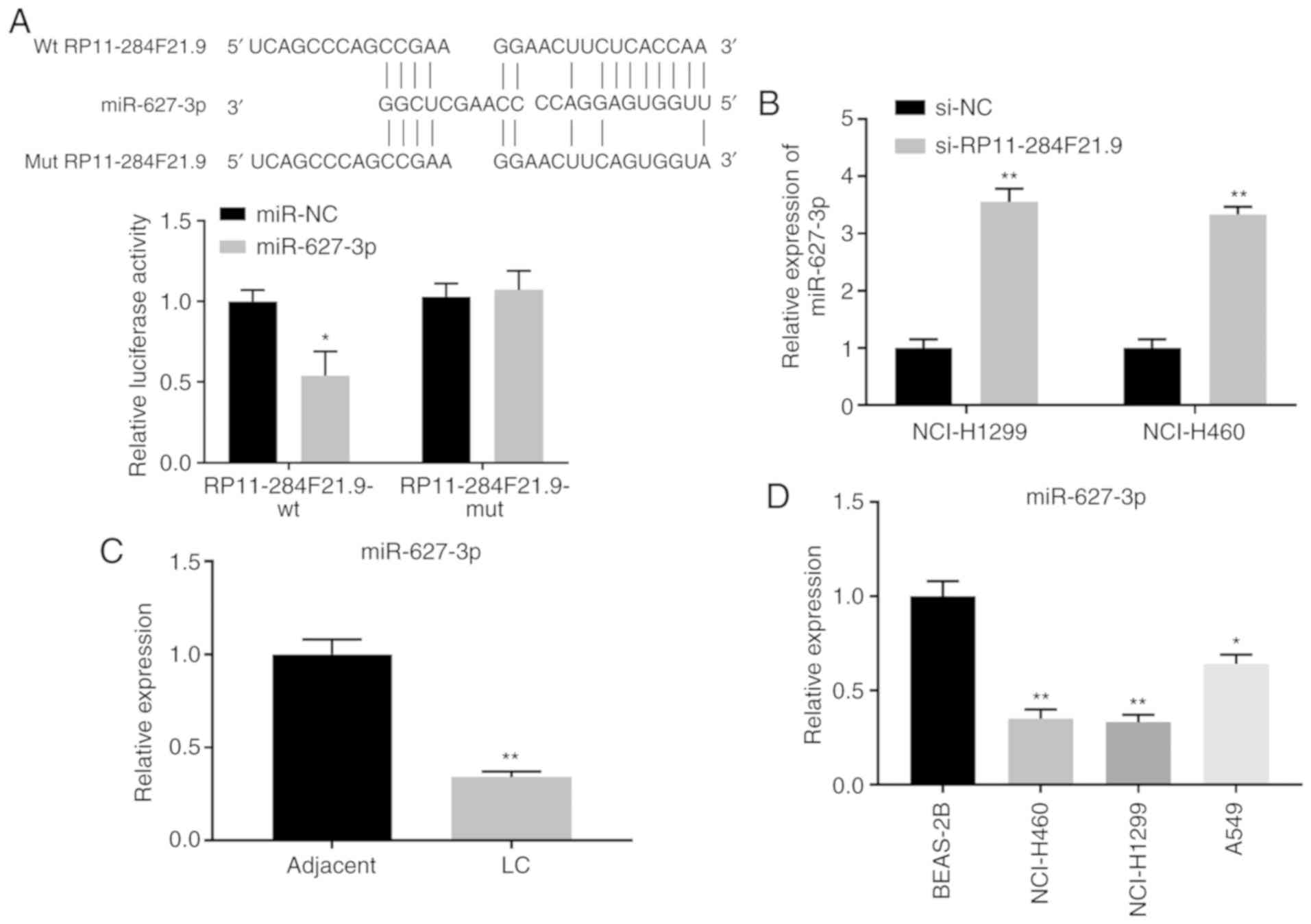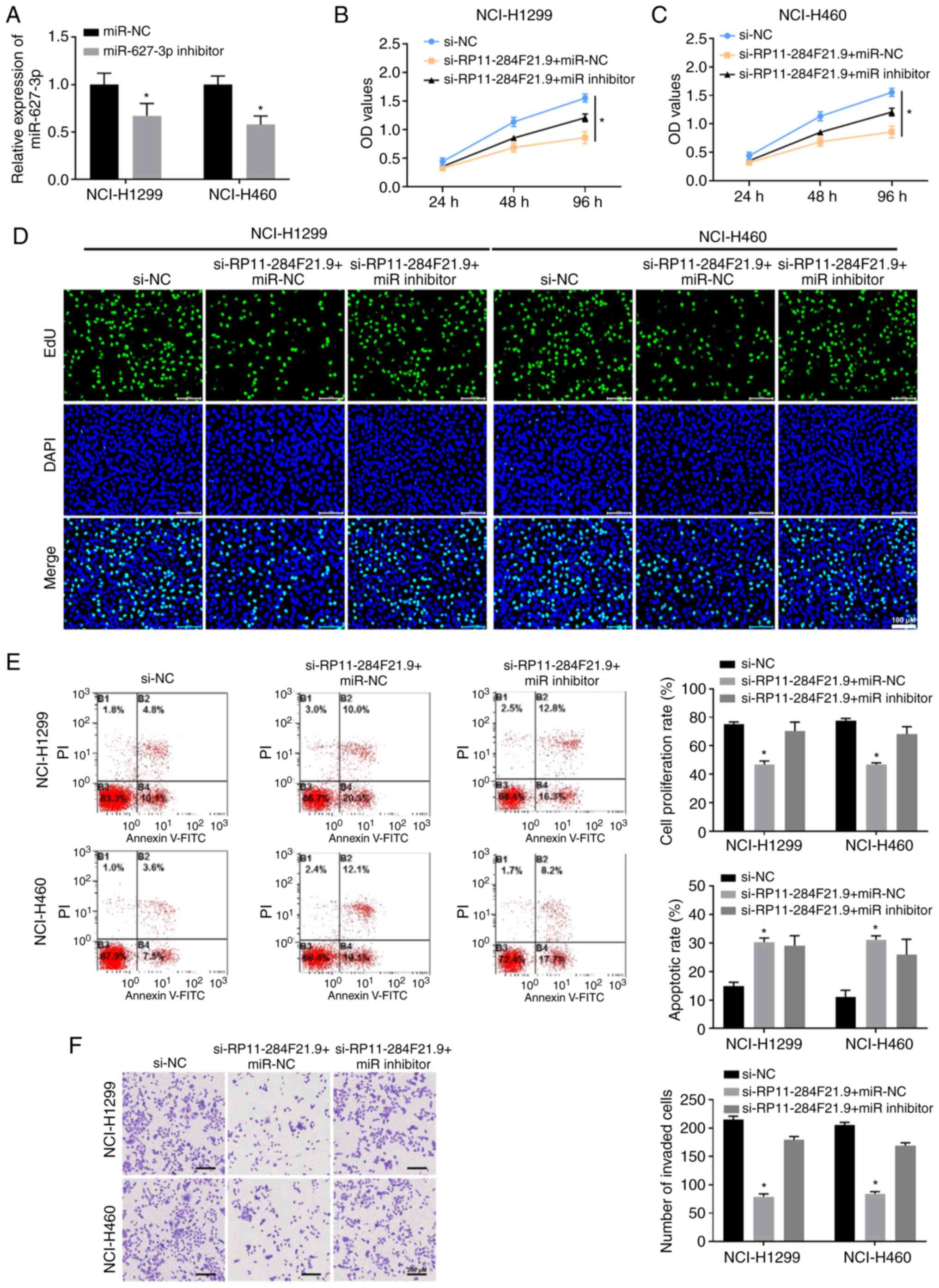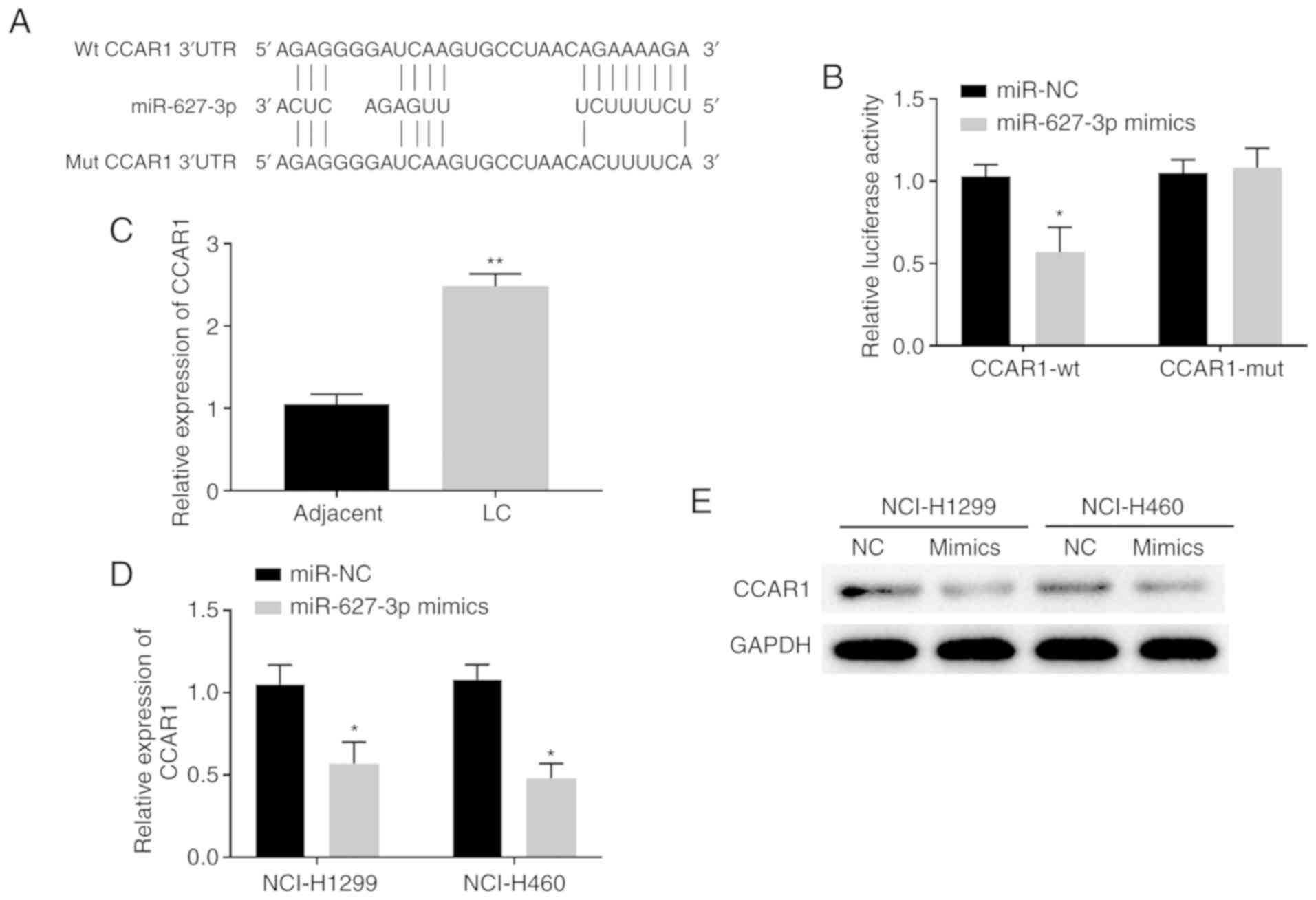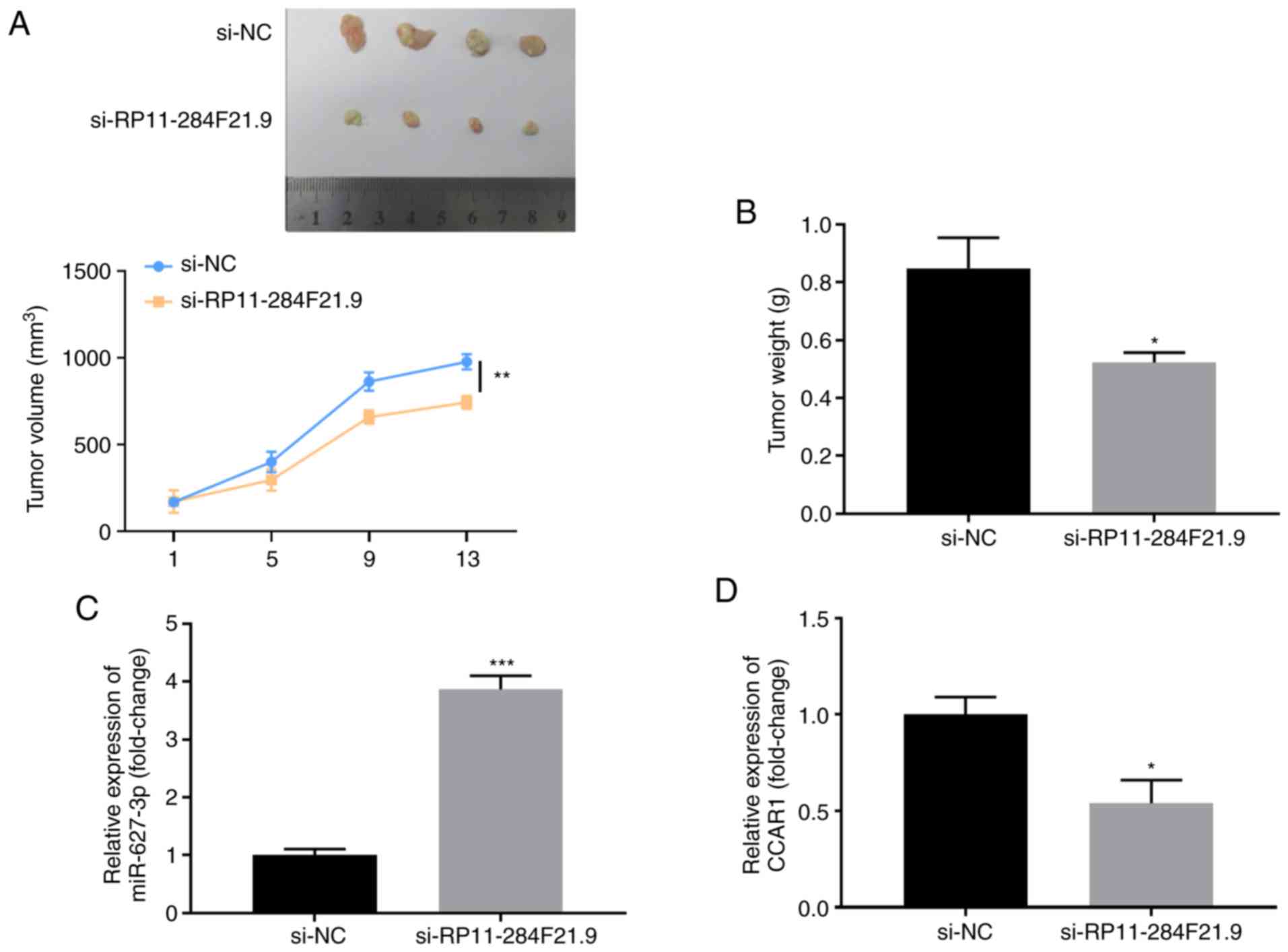|
1
|
Siegel RL, Miller KD and Jemal A: Cancer
statistics, 2019. CA Cancer J Clin. 69:7–34. 2019. View Article : Google Scholar : PubMed/NCBI
|
|
2
|
Chen W, Zheng R, Baade PD, Zhang S, Zeng
H, Bray F, Jemal A, Yu XQ and He J: Cancer statistics in China,
2015. CA Cancer J Clin. 66:115–132. 2016. View Article : Google Scholar : PubMed/NCBI
|
|
3
|
Chheang S and Brown K: Lung cancer
staging: Clinical and radiologic perspectives. Semin Intervent
Radiol. 30:99–113. 2013. View Article : Google Scholar : PubMed/NCBI
|
|
4
|
Pao W and Girard N: New driver mutations
in non-small-cell lung cancer. Lancet Oncol. 12:175–180. 2011.
View Article : Google Scholar : PubMed/NCBI
|
|
5
|
Iyer MK, Niknafs YS, Malik R, Singhal U,
Sahu A, Hosono Y, Barrette TR, Prensner JR, Evans JR, Zhao S, et
al: The landscape of long noncoding RNAs in the human
transcriptome. Nat Genet. 47:199–208. 2015. View Article : Google Scholar : PubMed/NCBI
|
|
6
|
Alizadeh A, Moztarzadeh F, Ostad SN, Azami
M, Geramizadeh B, Hatam G, Bizari D, Tavangar SM, Vasei M and Ai J:
Synthesis of calcium phosphate-zirconia scaffold and human
endometrial adult stem cells for bone tissue engineering. Artif
Cells Nanomed Biotechnol. 44:66–73. 2016. View Article : Google Scholar : PubMed/NCBI
|
|
7
|
Peng W, Wang J, Shan B, Peng Z, Dong Y,
Shi W, He D, Cheng Y, Zhao W, Zhang C, et al: Diagnostic and
prognostic potential of circulating long non-coding RNAs in non
small cell lung cancer. Cell Physiol Biochem. 49:816–827. 2018.
View Article : Google Scholar : PubMed/NCBI
|
|
8
|
Du Z, Fei T, Verhaak RG, Su Z, Zhang Y,
Brown M, Chen Y and Liu XS: Integrative genomic analyses reveal
clinically relevant long noncoding RNAs in human cancer. Nat Struct
Mol Biol. 20:908–913. 2013. View Article : Google Scholar : PubMed/NCBI
|
|
9
|
Huarte M: The emerging role of lncRNAs in
cancer. Nat Med. 21:1253–1261. 2015. View
Article : Google Scholar : PubMed/NCBI
|
|
10
|
Tian X and Xu G: Clinical value of lncRNA
MALAT1 as a prognostic marker in human cancer: Systematic review
and meta-analysis. BMJ Open. 5:e0086532015. View Article : Google Scholar : PubMed/NCBI
|
|
11
|
Wang JZ, Xiang JJ, Wu LG, Bai YS, Chen ZW,
Yin XQ, Wang Q, Guo WH, Peng Y, Guo H and Xu P: A genetic variant
in long non-coding RNA MALAT1 associated with survival outcome
among patients with advanced lung adenocarcinoma: A survival cohort
analysis. BMC Cancer. 17:1672017. View Article : Google Scholar : PubMed/NCBI
|
|
12
|
Loewen G, Jayawickramarajah J, Zhuo Y and
Shan B: Functions of lncRNA HOTAIR in lung cancer. J Hematol Oncol.
7:902014. View Article : Google Scholar : PubMed/NCBI
|
|
13
|
Liu XH, Liu ZL, Sun M, Liu J, Wang ZX and
De W: The long non-coding RNA HOTAIR indicates a poor prognosis and
promotes metastasis in non-small cell lung cancer. BMC Cancer.
13:4642013. View Article : Google Scholar : PubMed/NCBI
|
|
14
|
Nakagawa T, Endo H, Yokoyama M, Abe J,
Tamai K, Tanaka N, Sato I, Takahashi S, Kondo T and Satoh K: Large
noncoding RNA HOTAIR enhances aggressive biological behavior and is
associated with short disease-free survival in human non-small cell
lung cancer. Biochem Biophys Res Commun. 436:319–324. 2013.
View Article : Google Scholar : PubMed/NCBI
|
|
15
|
Nie W, Ge HJ, Yang XQ, Sun X, Huang H, Tao
X, Chen WS and Li B: LncRNA-UCA1 exerts oncogenic functions in
non-small cell lung cancer by targeting miR-193a-3p. Cancer Lett.
371:99–106. 2016. View Article : Google Scholar : PubMed/NCBI
|
|
16
|
Cheng N, Cai W, Ren S, Li X, Wang Q, Pan
H, Zhao M, Li J, Zhang Y, Zhao C, et al: Long non-coding RNA UCA1
induces non-T790M acquired resistance to EGFR-TKIs by activating
the AKT/mTOR pathway in EGFR-mutant non-small cell lung cancer.
Oncotarget. 6:23582–23593. 2015. View Article : Google Scholar : PubMed/NCBI
|
|
17
|
Ashouri A, Sayin VI, Van den Eynden J,
Singh SX, Papagiannakopoulos T and Larsson E: Pan-cancer
transcriptomic analysis associates long non-coding RNAs with key
mutational driver events. Nat Commun. 7:131972016. View Article : Google Scholar : PubMed/NCBI
|
|
18
|
Dwyer CA, Bi WL, Viapiano MS and Matthews
RT: Brevican knockdown reduces late-stage glioma tumor
aggressiveness. J Neurooncol. 120:63–72. 2014. View Article : Google Scholar : PubMed/NCBI
|
|
19
|
Livak KJ and Schmittgen TD: Analysis of
relative gene expression data using real-time quantitative PCR and
the 2(-Delta Delta C(T)) method. Methods. 25:402–408. 2001.
View Article : Google Scholar : PubMed/NCBI
|
|
20
|
Padi SK, Zhang Q, Rustum YM, Morrison C
and Guo B: MicroRNA-627 mediates the epigenetic mechanisms of
vitamin D to suppress proliferation of human colorectal cancer
cells and growth of xenograft tumors in mice. Gastroenterology.
145:437–446. 2013. View Article : Google Scholar : PubMed/NCBI
|
|
21
|
Sun M, Zhang Q, Yang X, Qian SY and Guo B:
Vitamin D enhances the efficacy of irinotecan through
miR-627-mediated inhibition of intratumoral drug metabolism. Mol
Cancer Ther. 15:2086–2095. 2016. View Article : Google Scholar : PubMed/NCBI
|
|
22
|
Shin VY, Ng EK, Chan VW, Kwong A and Chu
KM: A three-miRNA signature as promising non-invasive diagnostic
marker for gastric cancer. Mol Cancer. 14:2022015. View Article : Google Scholar : PubMed/NCBI
|
|
23
|
Cao J, Luo C, Yan R, Peng R, Wang K, Wang
P, Ye H and Song C: rs15869 at miRNA binding site in BRCA2 is
associated with breast cancer susceptibility. Med Oncol.
33:1352016. View Article : Google Scholar : PubMed/NCBI
|
|
24
|
Li J, Kong X, Jiang S, Liao W, Zhang Z,
Song J, Liang Y and Zhang W: miR-627/HMGB1/NF-κB regulatory loop
modulates TGF-β1-induced pulmonary fibrosis. J Cell Biochem.
120:2983–2993. 2019. View Article : Google Scholar : PubMed/NCBI
|
|
25
|
Musri MM, Coll-Bonfill N, Maron BA,
Peinado VI, Wang RS, Altirriba J, Blanco I, Oldham WM, Tura-Ceide
O, García-Lucio J, et al: MicroRNA dysregulation in pulmonary
arteries from chronic obstructive pulmonary disease. relationships
with vascular remodeling. Am J Respir Cell Mol Biol. 59:490–499.
2018. View Article : Google Scholar : PubMed/NCBI
|
|
26
|
Lu Z, Yu Y, Ding X, Jin D, Wang G, Zhou Y,
Zhu Y, Na L, He Y and Wang Q: LncRNA FLJ33360 accelerates the
metastasis in hepatocellular carcinoma by targeting miRNA-140/MMP9
axis. Am J Transl Res. 12:583–591. 2020.PubMed/NCBI
|
|
27
|
Huang W, Huang F, Lei Z and Luo H: LncRNA
SNHG11 promotes proliferation, migration, apoptosis, and autophagy
by regulating hsa-miR-184/AGO2 in HCC. Onco Targets Ther.
13:413–421. 2020. View Article : Google Scholar : PubMed/NCBI
|
|
28
|
Sui G, Zhang B, Fei D, Wang H, Guo F and
Luo Q: The lncRNA SNHG3 accelerates papillary thyroid carcinoma
progression via the miR-214-3p/PSMD10 axis. J Cell Physiol. Feb
11–2020.(Epub ahead of print). View Article : Google Scholar
|
|
29
|
Rishi AK, Zhang L, Boyanapalli M, Wali A,
Mohammad RM, Yu Y, Fontana JA, Hatfield JS, Dawson MI, Majumdar AP
and Reichert U: Identification and characterization of a cell cycle
and apoptosis regulatory protein-1 as a novel mediator of apoptosis
signaling by retinoid CD437. J Biol Chem. 278:33422–33435. 2003.
View Article : Google Scholar : PubMed/NCBI
|
|
30
|
Kim JH, Yang CK, Heo K, Roeder RG, An W
and Stallcup MR: CCAR1, a key regulator of mediator complex
recruitment to nuclear receptor transcription complexes. Mol Cell.
31:510–519. 2008. View Article : Google Scholar : PubMed/NCBI
|
|
31
|
Ou CY, Kim JH, Yang CK and Stallcup MR:
Requirement of cell cycle and apoptosis regulator 1 for target gene
activation by Wnt and beta-catenin and for anchorage-independent
growth of human colon carcinoma cells. J Biol Chem.
284:20629–20637. 2009. View Article : Google Scholar : PubMed/NCBI
|
|
32
|
Yan L, You WQ, Sheng NQ, Gong JF, Hu LD,
Tan GW, Chen HQ and Wang ZG: A CREB1/miR-433 reciprocal feedback
loop modulates proliferation and metastasis in colorectal cancer.
Aging (Albany NY). 10:3774–3793. 2018. View Article : Google Scholar : PubMed/NCBI
|
|
33
|
Chang TS, Wei KL, Lu CK, Chen YH, Cheng
YT, Tung SY, Wu CS and Chiang MK: Inhibition of CCAR1, a
coactivator of β-catenin, suppresses the proliferation and
migration of gastric cancer cells. Int J Mol Sci. 18:4602017.
View Article : Google Scholar
|
|
34
|
Cheriyan VT, Alsaab H, Sekhar S, Venkatesh
J, Mondal A, Vhora I, Sau S, Muthu M, Polin LA, Levi E, et al: A
CARP-1 functional mimetic compound is synergistic with
BRAF-targeting in non-small cell lung cancers. Oncotarget.
9:29680–29697. 2018. View Article : Google Scholar : PubMed/NCBI
|
|
35
|
Muthu M, Somagoni J, Cheriyan VT, Munie S,
Levi E, Ashour AE, Yassin AE, Alafeefy AM, Sochacki P, Polin LA, et
al: Identification and testing of novel CARP-1 functional mimetic
compounds as inhibitors of non-small cell lung and triple negative
breast cancers. J Biomed Nanotechnol. 11:1608–1627. 2015.
View Article : Google Scholar : PubMed/NCBI
|
|
36
|
Chen Y, Huang Q, Liu W, Zhu Q, Cui CP, Xu
L, Guo X, Wang P, Liu J, Dong G, et al: Mutually exclusive
acetylation and ubiquitylation of the splicing factor SRSF5 control
tumor growth. Nat Commun. 9:24642018. View Article : Google Scholar : PubMed/NCBI
|
















